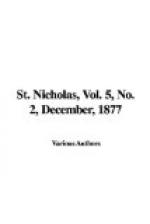The lion was too excited and famished to remain long undecided. After more backward steps, which he made as if gaining time for reflection, he suddenly advanced in a sidelong direction in order to charge upon his adversary.
[Illustration: “The beast gave A mighty spring.”]
The Sicilian did not move, but followed with his fixed gaze the motions of the lion. Greatly irritated, the beast gave a mighty spring, uttering a terrible roar; the man, at the same moment, leaped aside, and the lion had barely touched the ground, when the club came down upon his head with a dull, shocking thud. The king of the desert rolled heavily under the stroke, and fell headlong, stunned and senseless, but not dead.
The spectators, overcome with admiration, and awed at the exhibition of so much calmness, address and strength, were hushed into profound silence. The next moment, the Bey arose, and, with a gesture of his hand, asked mercy for his favorite lion.
“A thousand ducats the more if you will not kill him!” he cried to the Sicilian. “Agreed!” was the instant reply.
The lion lay panting on the ground. The Hercules bowed at the word of the Bey, and slowly withdrew, still keeping his eyes on the conquered brute. The two thousand ducats were counted out and paid. The lion shortly recovered.
With a universal gasp of relief, followed by deafening shouts and cheers, the spectators withdrew from the terrace, having witnessed a scene they could never forget, and which, as I said at the beginning, is still talked of in Tunis.
BRUNO’S REVENGE.
By the author of “Alice in Wonderland.”
It was a very hot afternoon,—too hot to go for a walk or do anything,—or else it wouldn’t have happened, I believe.
In the first place, I want to know why fairies should always be teaching us to do our duty, and lecturing us when we go wrong, and we should never teach them anything? You can’t mean to say that fairies are never greedy, or selfish, or cross, or deceitful, because that would be nonsense, you know. Well, then, don’t you agree with me that they might be all the better for a little scolding and punishing now and then?
I really don’t see why it shouldn’t be tried, and I’m almost sure (only please don’t repeat this loud in the woods) that if you could only catch a fairy, and put it in the corner, and give it nothing but bread and water for a day or two, you’d find it quite an improved character; it would take down its conceit a little, at all events.
The next question is, what is the best time for seeing fairies? I believe I can tell you all about that.
The first rule is, that it must be a very hot day—that we may consider as settled; and you must be just a little sleepy—but not too sleepy to keep your eyes open, mind. Well, and you ought to feel a little—what one may call “fairyish”—the Scotch call it “eerie,” and perhaps that’s a prettier word; if you don’t know what it means, I’m afraid I can hardly explain it; you must wait till you meet a fairy, and then you’ll know.




